Don’t Let DIY Skincare Recipes Ruin Your Face
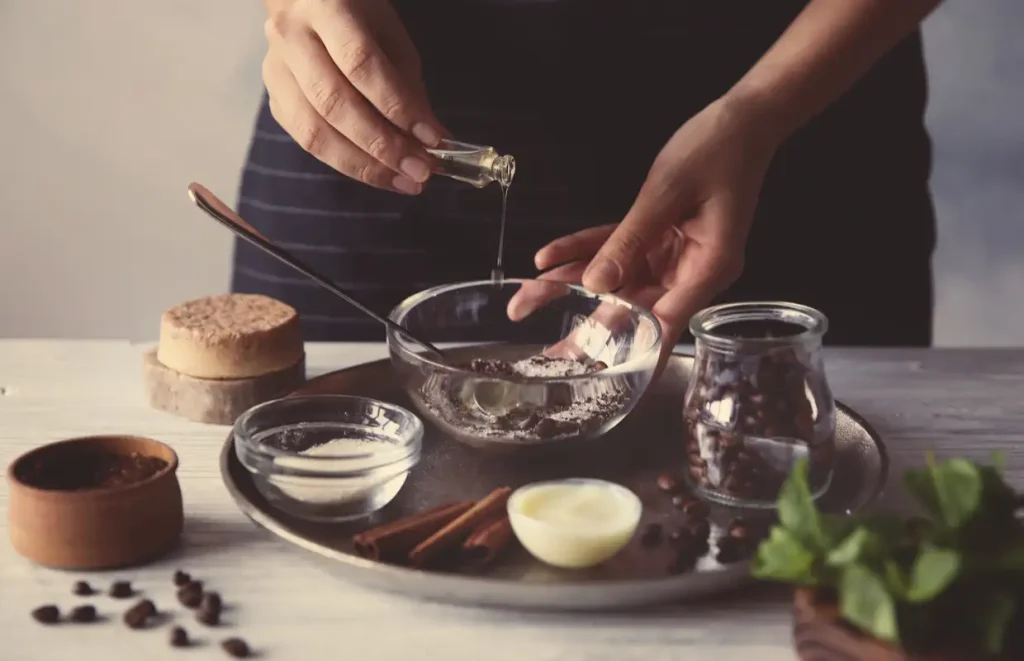
Honey, oatmeal, turmeric, yogurt, cucumber… it’s tempting to DIY your special kitchen formulated skincare in the comfort of home. I used to craft my own, believing it was the “‘natural and nourishing” experience my skin craved. Yet, skin is adept at hiding irritation. Things seem fine initially, but one day, you realize the skin’s barrier is damaged.
Lesson learned: just because a DIY recipe is simple to make or “natural” doesn’t mean your skin will LIKE it🙃.
This article doesn’t dismiss all DIY routes for achieving that at-home glow. Instead, it’s a call for everyone to treat our body’s largest organ, the skin, with the TLC it deserves. So, let’s take a closer look at those popularly endorsed kitchen ingredients and examine them one by one.
Coffee Grounds
Storytime: When I first started in beauty, I scheduled an interview with a journalist to talk about a coffee grounds scrub. Natural and eco-friendly, it seemed like a great idea. Excited, I tried it myself before the shoot, thinking it would make me nice on camera. But instead of glowing skin, I ended up with red, swollen patches between my eyebrows and on the sides of my nose. It felt like my face had met a cactus.
The Exfoliating Prowess
That said, coffee grounds remain a popular choice for at-home beauty treatments among the skin-care obsessed masses. They are touted as a miracle exfoliant due to the grainy and scrubby texture that effectively cleanses the skin’s surface. In 20131, researchers found coffee acids provide antioxidant and antimicrobial benefits. As such, they might increase collagen and slow down cell aging.
A simple coffee-based exfoliating scrub2 can include:
- 1/4 cup fresh coffee grounds
- 1/4 cup brown sugar
- Lemon juice to desired consistency
It is suggested to apply the mixture to clear away dead skin cells every few days.
Reddit’s Take on Coffee Grounds for Skincare
While it doesn’t work for me, I searched on Reddit for genuine feedback from real users:
Application Zones
FACE:
- “I use it on my face about once a week.”
- “I read about how you can exfoliate with coffee grounds without upsetting the pH of your face. I tried it tonight and it made my face feel super soft. Turns out the caffeine probably helps tighten skin too.”
- “I’ve used coffee grounds as a mask before – not to exfoliate, I just leave them on my face for a bit then carefully wash them off. The results were quite nice.”
- “I do a coffee grounds exfoliation on my face and a sugar scrub on my body every two weeks. “
BODY:
- “I like a good abrasion on my legs and knees, I have super rough skin, but you would have to make sure the coffee is finely and uniformly ground.”
- “I’ve been mixing coffee grounds with some sugar and olive oil and using it as a body scrub for years.”
- “About once a week I use regular (coarse) coffee grounds as a main body exfoliant.”
- “I’ve tried the fig + yarrow coffee scrub and I personally love it. I only use it on my body, it’s much too harsh for my face.”
The Results
- “I woke up this morning and my closed comedones that have been there for as long as I can remember are almost completely gone!”
- “The spots I used it on were a little red afterward, but that subsided quickly.”
- “It did seem to make my face less puffy and more fresh looking.”
- “Helps with cracked heels and also leaves the feet supple.”
Personal Tips:
- “I’m veryyy cautious about what I use on my face, and rubbing a harsh coffee scrub on it just didn’t seem right to me haha.”
- “Try using instant coffee if you really want to do it. The instant coffee kind of dissolves quickly and is soft so it’s not as abrasive.”
- “It’s great for the thicker body skin (like arms and legs), but it’s not okay for delicate skin (face, neck, decolletage, etc.).”
FYI Before You DIY:
Reflecting on my previous coffee scrub experience: I thought it was an allergy, but later realized it was actually cuts.
But how?
Of course, it’s not about causing profuse bleeding, but the machine used for grinding coffee beans isn’t designed to produce smooth “beauty grounds.” Therefore, the grounds right from your cup of joe are inevitably sharp-edged and finely pointed, which can act like blades on delicate skin. When used to scrub the skin, they can easily leave micro tears.
Hence, I wouldn’t suggest using homemade coffee scrubs for facial abrasion though it may be ideal for rough or thick-skinned areas like your feet, knees, and elbows.
Additionally, you should use the scrub over a sink with a strainer and either throw it away or compost it. This is because finely ground coffee scrub, even if used only once a week, can eventually mix with oils in the drain and clog it up!
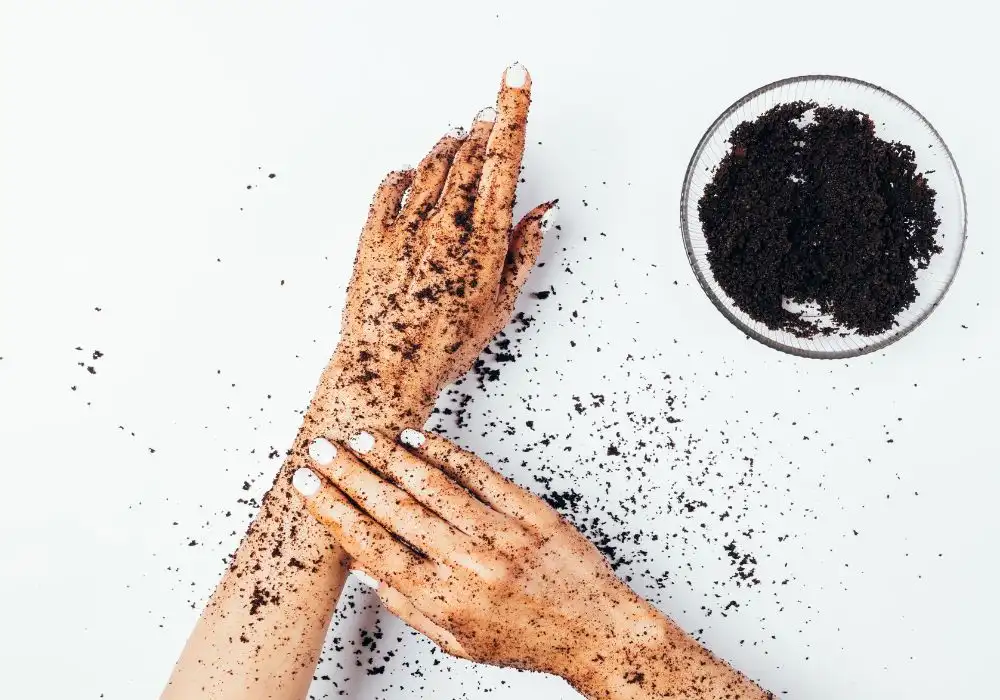
Oatmeal
When it comes to going the natural route, oatmeal is also a top pick. Fans swear by oatmeal mostly for its skin-smoothing prowess. Usual DIY practices include using ground oatmeal as a gentle physical scrub or wash. Some mix it with water, milk, yogurt, or honey to make a face mask. Others take oatmeal baths for their moisturizing and nourishing effects.
We looked into what people think about oatmeal in their skincare routines:
It seems it’s mild enough for people with very sensitive skin as well as eczema sufferers: “It didn’t irritate my eczema and felt nice.”
A woman shared that oatmeal helped a lot in calming her face and stopping more breakouts from arising. However, after about a month of use, her combination/oily skin became very dry.
A point of interest is that during this period, she had to give up all her beauty products due to acne issues, and oatmeal helped her skin recover to the point where she could resume her pre-breakout skin care regimen.
Dermatologists say colloidal oatmeal is great for sensitive skin.
Since the 1940s, colloidal oatmeal has been used to soothe itching, irritation, and dry skin, though its full benefits are still being explored.
Dr. Robert Anolik, member of AAD, says oatmeal leaves moisturizing polysaccharides and lubricating fats on your skin, keeping it hydrated and repairing its barrier. Dr. Alan Parks, founder of DermWarehouse, indicates that oatmeal is also beneficial for skin issues like eczema and psoriasis. It soothes the skin and helps maintain its moisture barrier. Dr. Khetarpal, a dermatologist at Cleveland Clinic, highlights that colloidal oatmeal is especially beneficial for people with sensitive, dry, or eczema-prone skin, as it forms a protective layer on the skin’s surface.
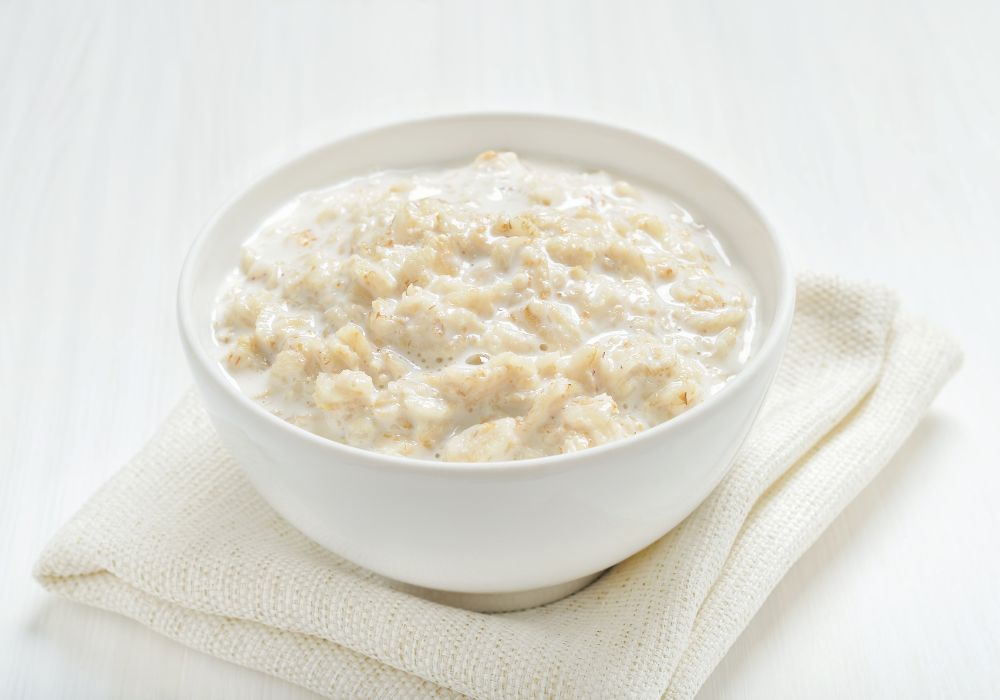
Coconut Oil
Personally, I like using cold-pressed or extra virgin coconut oil on my hair because it’s rich in medium-chain fatty acids and vitamin E, and thus can moisturize and repair damaged hair.
In the beauty world, it’s commonly agreed that coconut oil is best for moisturizing body parts other than the face because it ranks high for causing acne: Coconut oil has a score of 4, meaning it can clog pores (5 is the highest).
We also searched Reddit and Quora for various real user feedback and found that among those who use coconut oil on their face, a few had no issues with it at all:
- “I have no pronounced wrinkles at 76. I use Coconut oil mixed with about 20% Emu oil on my face every day.”
- “I use it as a moisturizer on my face and it works well for me.”
- “I have never had an issue with organic coconut oil, either on face or body.”
However, more people shared that using it on their face wrecked their skin:
- “I used coconut oil on my face for a month and got severe acne which stayed on my face for 2 years.”
- “If I put it on my face, I will 100% break out and it won’t be cute.”
- “It gave me closed comedones all over my face and now I’m going through an ugly purge(been almost 3 months and starting to see results just now) by using tretinoin to get my skin back to normal. “
Overall, coconut oil isn’t suitable for everyone. The smart approach is always to patch test on a small section of your skin, as you would with any other skincare product.
Interestingly, even if you have acne-prone skin, it doesn’t mean you should completely stay away from coconut oil. It may aggravate certain types of acne. But if yours is caused by bacterial overgrowth, using coconut oil might HELP due to its antibacterial properties.
Moreover, dry, chafed, or flaky skin types may not benefit from coconut oil as expected. In fact, it can often make dry skin appear and feel even drier if applied on its own. As dermatologist Dr. Purvisha Patel suggested, “It is still best used over a moisturizer, or on damp skin.”3
If you prefer not to take risks, consider using formulas that contain coconut oil rather than applying it directly to your skin.

Yogurt
Yogurt is having its heyday. It is touted to moisturize, brighten, even out your skin tone, and make it more elastic. Studies support its moisturizing4, elasticity-boosting5, and anti-aging6 benefits. Probiotics in yogurt are good for acne and inflammation too.
Adding yogurt to DIY skincare routines is a growing trend.
On social media and forums, some report that their skin feels soothed and hydrated after a 15-minute yogurt facial. Some use it to treat sunburns, and it works very well: “I’ve only used yogurt or sour cream as a mask when I accidentally got sunburnt during a long walk. Took away the burn and color in 20 mins!”
Yogurt is also used to fight acne as commented by this Reddit user: “It honestly works great in drying out pimples for me.” However, she finds that if she uses it for too many days, her skin becomes fragile, and small, itchy bumps appear. This held us back before we reached out to the fridge.
Let’s see what the experts say.
Michelle Wong, a cosmetic chemist and science educator, explains that yogurt masks can give temporary benefits, but for longer-lasting effects, skincare formulas with higher lactic acid concentrations are preferable. Yogurt contains only around 1% lactic acid, while most AHA products have 5% or higher.
According to Dr. Joshua Zeichner, who leads cosmetic and clinical research in dermatology at Mount Sinai Hospital, probiotics in yogurt can help maintain a healthy skin microbiome, which may assist in combating aging and minimizing wrinkles and lines. Yet, she suggests using probiotic skincare products instead, as they are pH-balanced and offer more hydration than an average jar of yogurt.
Dr. Dray, a dermatologist active on YouTube, indicates that yogurt masks can aid in moisturizing, anti-aging, and combating acne. However, she warns that applying food directly to the skin can be more irritating than using a formulated product.
Still, it’s tempting to DIY a yogurt recipe…
We totally get it. But here’s the thing: not all yogurts are created equal.
Plain (unflavored), full-fat Greek yogurt is generally considered the best type of yogurt to use for a DIY face pack. And it’s advised to start simply by applying only yogurt, instead of mixing it with other ingredients.
Some recommend adding lemon juice, but it might cause a bad skin reaction called phytophotodermatitis. That means if you’re out in the sun, it can give you big blisters and leave white spots that won’t go away.
If you are considering using it as a natural exfoliant, you might try buttermilk instead. It has about 3-4% lactic acid, which is way more than yogurt. The downside? It’s pretty runny and kind of stinky😑.
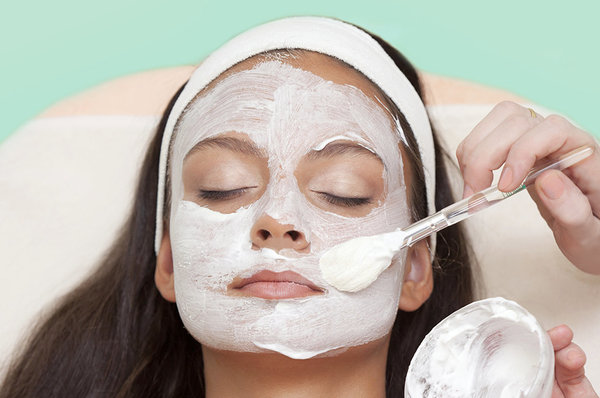
Lemon Juice
You’re not the only one who has come across this DIY beauty hack: wiping your face with lemon juice to reduce fine lines, wrinkles, whiteheads, and sunspots.
Known for being rich in vitamin C and citric acid, lemons are celebrated for their detoxifying properties, particularly when infusing fresh slices into your drinking water.
Thus, someone wonders: Why not let our skin directly experience this magical benefit?
Lemon has a pH of about two.
The problem is, our skin’s optimal pH is between 4.7 and 5.75. This means improper use of citric acid can disturb the skin’s natural pH balance. As a result, the protective barrier is weakened, resulting in pigmentation, dryness, and sun damage.
Some say they’ve cured acne with lemon, but searching social media shows that many who share skincare advice likely haven’t tried it themselves. For lemon, in particular, personal use stories are scarce.
But horror stories do exist…
A lady observed patches on her face after using lemon toner for three months. Some areas had reduced pigmentation, leading to an uneven skin tone. Another case involves someone slathering lemon on their face daily for five days. This caused severe irritation, peeling, and the skin’s surface layer to shed. Although the lesions healed within five days, they resulted in depigmented patches.
If you still want to include lemons in your DIY endeavors:
Make sure to skip leave-on treatments with large amounts of juice. Only use rinse-off recipes with small amounts (no more than a few drops) of lemon juice. Stop using immediately if irritation or discoloration occurs. Before sun exposure, thoroughly wash off and apply sunscreen.
Ideally, you should ask a dermatologist about the correct juice-to-water mix right for your skin.

Honey
This sweet stuff truly sounds like the holy grail for addressing potential skin woes. No wonder there are tons and tons of bloggers and TikTokers telling you how honey has saved their skin.
We’ve checked out what people think about swiping honey on the face:
While some swear by honey masks for brightening and hydrating their skin, others have had bad breakouts or allergic reactions, like blotchy red swollen faces or hives. Some find it great for fungal acne and see results like less frequent whiteheads or pimples.
Raw or manuka honey is what everyone’s raving about.
These are popular among DIY fans for cleansers or masks as they moisturize dry skin well. In addition, there is evidence from studies showing that honey has antimicrobial and anti-inflammatory abilities. So it makes sense that medical-grade honey is utilized in clinical practice for wound healing.
However, limited data supports honey’s clinical benefits for acne treatment. Research in the Journal of Antibacterial Chemotherapy7 found honey effective against staphylococci bacteria but not against P. acnes, the bacteria that leads to spots.
So why are there so many internet remedies about honey curing acne? Kate Bancroft, creator of an online skin clinic, states that honey does help calm down the redness associated with acne due to its anti-inflammatory properties. Still, she would not personally recommend it to her patients.
Expect it to HYDRATE more than treat acne.
Occasionally pampering yourself with a DIY honey facial is perfectly OK, as long as you’re not allergic. Meanwhile, stay away from those fake honey with corn syrup or other additives. You don’t want a breakout.
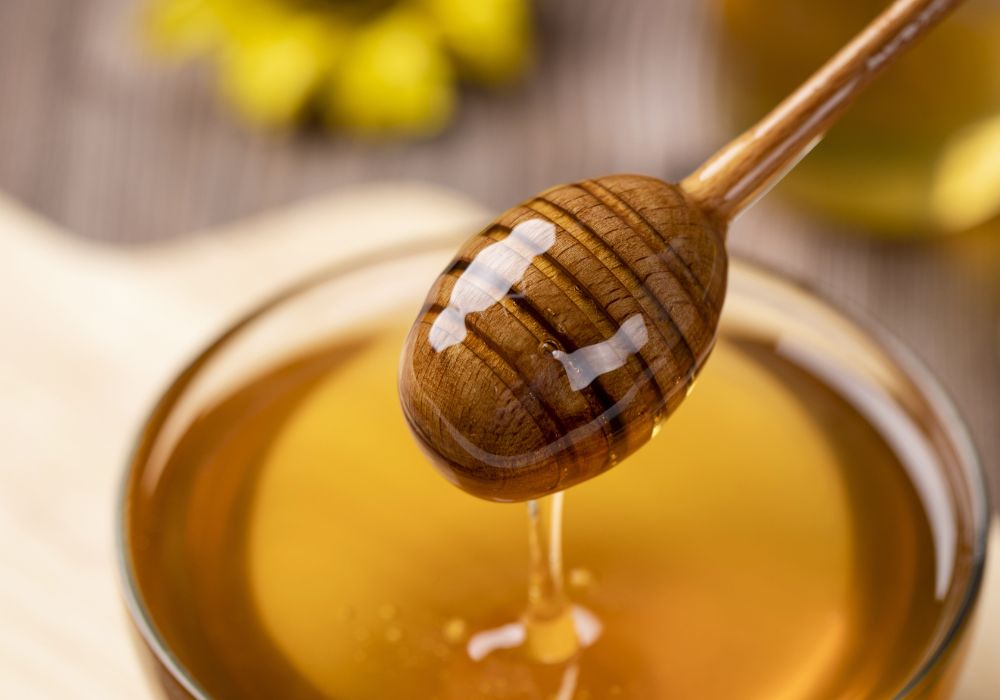
Cinnamon
Rich in antioxidants and beneficial plant compounds, cinnamon is a favored ingredient in perfumes, creams, lip balms, and scrubs. Honestly, it’s unsurprising that it went from the spice rack to DIY skincare remedies.
Despite its popularity, many remain doubtful about cinnamon’s skincare benefits. Adding cinnamon, especially Ceylon cinnamon, to your dishes could be a good way to boost your antioxidant intake. However, there’s little research backing its use for anti-aging, skin lightening, acne, discoloration, or other skin issues.
My face got inflamed and red and irritated.
A honey+cinnamon mask is touted as a popular homemade recipe for treating spots. Yet, for people who have tried it, cinnamon seems a big skin no-no.
People have reported long-lasting redness, rashes, and even burns from using cinnamon on their skin. Some say it’s like putting habanero pepper on your face, which highlights how irritating it can be.
A Reddit user said she applied honey, cinnamon, and turmeric to help dry out her pimples. But she also added, “I don’t have sensitive skin, and I don’t claim it’s a cure that will work for everyone.”
Things to keep in mind before cinnamon DIYs:
Never ever use cinnamon alone as a facial scrub. Some may think the burning sensation means it’s working, but guess what, it is hurting your skin! Thinking of trying honey with cinnamon? Perhaps honey alone can deliver the anti-inflammatory effects you seek.
If natural remedies aren’t getting rid of your acne, don’t delay—seek advice and a thorough check-up from a dermatologist.

- https://pubs.rsc.org/en/content/getauthorversionpdf/c3ay41807c ↩︎
- https://www.medicalnewstoday.com/articles/322875#exfoliation ↩︎
- https://www.healthline.com/health/coconut-oil-moisturizer#_noHeaderPrefixedContent ↩︎
- https://www.ncbi.nlm.nih.gov/pubmed/22152494 ↩︎
- https://www.ncbi.nlm.nih.gov/pubmed/22152494 ↩︎
- https://www.ncbi.nlm.nih.gov/pmc/articles/PMC5418745/ ↩︎
- https://academic.oup.com/jac/article/56/1/228/706949?login=false ↩︎

